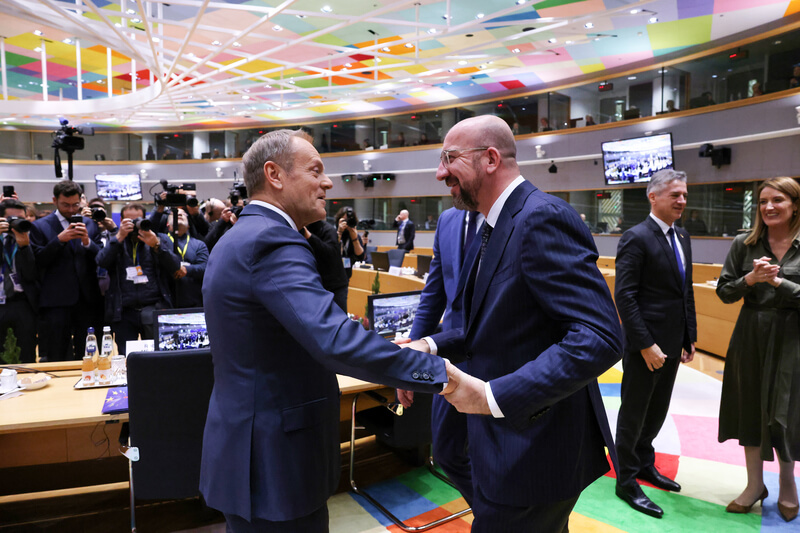Since he took office last week, Donald Tusk, who has returned to the post of Prime Minister of Poland, has started to fulfil his promises of "returning" the country to the EU and said he would ask for a more significant role in the EU than before.
Given that Tusk is an experienced former president of the European Council who is returning to lead a prominent member of the Union, Poland - and perhaps more so Brussels - celebrated the alliance of pro-European liberals and centrists winning the elections held last October.
Tusk's supporters in the country and partners in Brussels were relieved because of the departure from the scene of the Eurosceptic Law and Justice Party, which in the past 8 years has turned Poland into a despised relative in the European family.
Tusk's new government started strongly against the legacy of the conservatives. The leadership of the public news channel TVP and the state news agency PAP were replaced as symbols of years of bias towards the ruling party. The public TV channel even stopped broadcasting.
The positive reaction to Tusk's taking office arrived very rapidly, so Brussels has started to unfreeze a fund of around €60 billion for recovery from the consequences of COVID-19. That fund was frozen as a punishment for violating the rule of law.
Gift exchange
"It is not a small gift”, said Donald Tusk at last week's EU summit. He attended the summit just a day after he was sworn in. He also called the unfrozen €5 billion, which Ursula von der Leyen, the President of the European Commission, informed him about, a "Christmas present".
An exchange of gifts between Warsaw and Brussels was expected following Tusk's coalition's election victory last October. The transfer of substantial European funds intended for Poland was one of the incoming prime minister's principal pre-election promises, and he has already started to fulfil that promise.
Tusk's government will use its clear pro-European orientation and favour of Brussels to increase its influence in shared institutions
The EU, in turn, has gained a cooperative member state that will not cause headaches and question its shared policies, as was the case for the past 8 years with the government of Jarosław Kaczyński's Law and Justice Party.
However, in those 8 years, Poland has changed. It is not the same as during the previous mandate of Donald Tusk (2007-2014), just as the EU has changed, particularly its environment.
Tusk's government will use its clear pro-European orientation and favour of Brussels to increase its influence in shared institutions.
Warsaw wants more from the EU
However, Poland wants more than that. During the previous government, conservatives from the Law and Justice Party sought more influence and respect for Poland, even though they did so more often through conflict than cooperation with the rest of the EU.
Donald Tusk has the same ambition after an 8-year opposition break, but his method will be different and perhaps more successful.
"I can guarantee you that we will make Poland return to its rightful place”, said PM Tusk.
Poland wants to transform its position as the EU's sixth-largest economy into the same political, diplomatic and security influence in the EU.
If the price for that is the distancing of Warsaw from the Eastern European circle of the so-called "new Europe", this will not be a problem for Donald Tusk.
Hungarian Prime Minister Viktor Orbán said at the annual press conference this week that the cooperation of the 4 Eastern European EU members within the Visegrád Group (V4) "has fallen apart".
PM Orbán is mostly correct, even though he bypassed himself and his government's policies as the primary reason the V4 bloc has experienced a downward trajectory.
The V4 has grown into the V3+Hungary since the start of the Russian aggression against Ukraine
The 4-member block of Poland, the Czech Republic, Slovakia and Hungary functioned even before they joined the EU in 2004 as the backbone of the most substantial EU enlargement in its history.
As new members of the EU, for years, they acted in unison towards the EU, particularly towards the most influential members, Germany and France, protecting their specific interests and, at the same time, retaliating with pro-EU policies.
However, the V4 has already grown into the V3+Hungary since the start of the Russian aggression against Ukraine due to the emphasised withdrawal of Budapest regarding the shared European policy against Russia, that is, European support for Ukraine.
Influence without intermediaries
Donald Tusk will not have much reason to revitalise this bloc, given his ambition to realise his country's interests directly through strengthened ties with the "bosses" in Berlin and Paris, without any Eastern European mediation.
In recent years, and particularly since the start of the Russian aggression against Ukraine, Warsaw has shown strong leadership in supporting Ukraine through military aid and solidarity with millions of Ukrainians to whom it has given refuge from the war.
 Tusk's government will ask for a better place at the table where joint decisions are made
Tusk's government will ask for a better place at the table where joint decisions are made
The new Polish PM will stay on that course, just like the new, much harsher, European regime towards migrants and asylum seekers, thus being a strong protagonist of the EU's shared policy in its principal directions.
In a relatively short period of time, Tusk will cancel those internal deviations that gave Poland a poor reputation in the EU. The transformation of the influential media has already been initiated, and changes will follow in the judiciary according to the standards expected of an EU member.
In turn, Tusk's government will ask for a better place at the table where joint decisions are made. Germany and France, as the most influential members of the EU, will be Tusk's most significant targets through which he will try to achieve this.